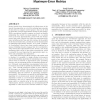Free Online Productivity Tools
i2Speak
i2Symbol
i2OCR
iTex2Img
iWeb2Print
iWeb2Shot
i2Type
iPdf2Split
iPdf2Merge
i2Bopomofo
i2Arabic
i2Style
i2Image
i2PDF
iLatex2Rtf
Sci2ools
127
click to vote
PODS
2004
ACM
2004
ACM
Deterministic Wavelet Thresholding for Maximum-Error Metrics
Several studies have demonstrated the effectiveness of the wavelet decomposition as a tool for reducing large amounts of data down to compact wavelet synopses that can be used to obtain fast, accurate approximate answers to user queries. While conventional wavelet synopses are based on greedily minimizing the overall root-mean-squared (i.e., L2-norm) error in the data approximation, recent work has demonstrated that such synopses can suffer from important problems, including severe bias and wide variance in the quality of the data reconstruction, and lack of non-trivial guarantees for individual approximate answers. As a result, probabilistic thresholding schemes have been recently proposed as a means of building wavelet synopses that try to probabilistically control other approximation-error metrics, such as the maximum relative error in data-value reconstruction, which is arguably the most important for approximate query answers and meaningful error guarantees. One of the main open ...
Database | Deterministic Wavelet Thresholding | One-dimensional Wavelet Thresholding | PODS 2004 | Wavelet Synopses |
| Added | 08 Dec 2009 |
| Updated | 08 Dec 2009 |
| Type | Conference |
| Year | 2004 |
| Where | PODS |
| Authors | Minos N. Garofalakis, Amit Kumar |
Comments (0)

